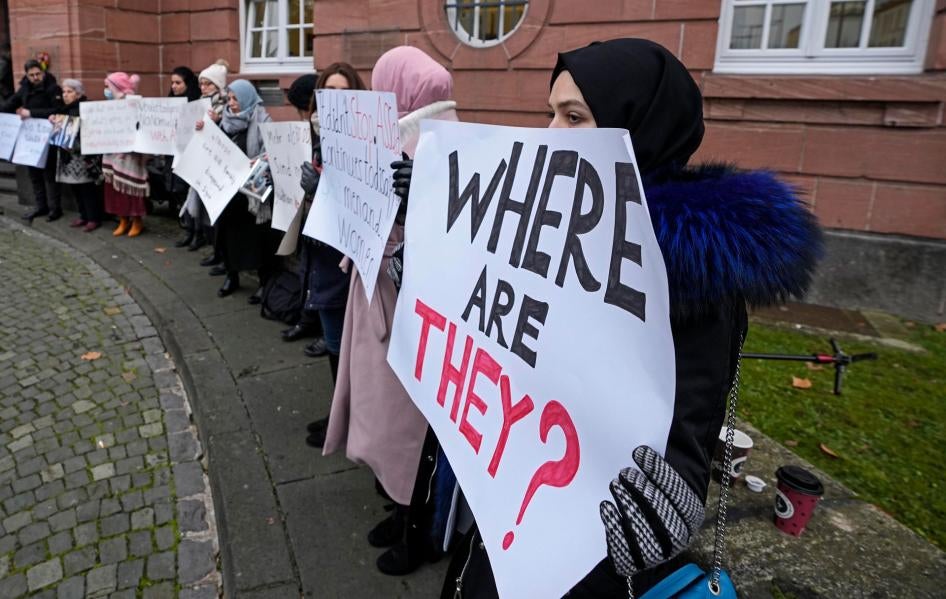Outrageous Depravity in Iran: Daily Brief
- Mahsa Amini’s Death in Iran;
- Syria Update;
- Good News: EuroPride in Serbia;
- Take Note;
- On Track in the Climate Crisis;
- Readers’ Top Quotes.
By Andrew Stroehlein. Contact me at DailyBriefTeam@hrw.org and Twitter @astroehlein.
Outrageous Depravity in Iran
Wear the hijab or wear a death shroud.
That seems to be the chilling message from Iran’s authorities after Tehran’s “morality police” – a less appropriate name is hard to imagine – took a woman into custody for not wearing the headcovering properly, gave her an “orientation class,” and then handed her in a coma to a hospital, where she died shortly after.
The death of 22-year-old Mahsa Amini has rightly caused outrage in Iran. Anger was already building over several other similar incidents where police used unlawful force against women for not complying with Iran’s compulsory hijab laws.
Now, there are public protests at which women are taking off their hijabs in open defiance.
The fear is that the regime will respond with its usual brutality towards protesters. The hope is they may listen to their fed-up citizens instead.
What that would mean in practice is, at the very least, conducting a transparent investigation into Mahsa’s death and holding those responsible to account. They should also provide reparations to her family.
But as rising anger shows, the problem runs far deeper than just the events of recent days.
The Iranian authorities need to scrap the compulsory hijab law altogether. It’s grossly discriminatory, as are a number of other laws that deprive women of their autonomy and rights.
Only then will there be progress in eliminating the discrimination, violence, and death that half of Iranian society endures from a repressive and unaccountable state.
As my colleague, Tara Sepehri Far, Iran and Kuwait researcher, puts it: “A woman dying after being arrested because of how she was dressed is evidence of outrageous depravity.”
And Iran’s discriminatory laws need to change to stop encouraging that depravity.
Syria Update
If Syria has faded from your news feeds in recent months, as other crises have gained prominence, it’s time to get back to it. Things are happening.
Most immediately worryingly, perhaps, the UN is warning that the brutal conflict, now in its eleventh year, may be about to escalate in a return to larger-scale fighting along several fronts.
In its new 50-page report, the UN Commission of Inquiry on Syria also confirmed, “continued patterns of crimes against humanity and war crimes related to torture and ill-treatment committed in Government detention to this day, also leading to the death of detainees.”
Some of those deaths in detention are highlighted in two new investigations – one by AFP, the other by the Association of Detainees and the Missing in Sednaya Prison – that delve into the “salt rooms” of Sednaya. In the absence of refrigerated morgues, these basic mortuaries are used to deal with the corpse production line of President Bashar al-Assad's industrial-scale prison killings.
This is no time to look away. We need to see stepped-up pressure for independent monitors to access prisons and detention centers without delay. We also need an international mechanism focused on determining the fates of the thousands of detained and disappeared in Syria.
Sometimes it seems the world has moved on from Syria. For Syrians face-to-face with the horrors of the regime, however, such a luxury is not available.
Good News: EuroPride in Serbia
Serbian government decision-making went back and forth for weeks – and right up to the last minute – but in the end, the EuroPride march took place in Belgrade on Saturday.
EuroPride is a regional celebration promoting equality for lesbian, gay, bisexual, and transgender (LGBT) people that Serbia was slated to host from September 12 to 18, with a march on September 17
Even just a few days ago, it had seemed like the government was surrendering to violent threats against the march by far-right extremists. Top officials were saying they could not protect marchers from thugs and guarantee Pride participants’ right to free assembly. The president bizarrely admitted that banning the parade was a violation of people’s rights but said it would be banned nevertheless. (see Daily Brief on September 2).
When the march finally went ahead, organizers and participants celebrated the win, but they also noted that several activists had been attacked, despite a promise of safety from the prime minister herself.
Kristine Garina, president of the EuroPride Organisers Association, said that the eleventh-hour reprieve from the prime minister was, “too little, too late” and called on her to ensure that all those who attacked Pride participants were brought to justice.
________________________________
Take Note
(curated today by Alice Autin)
- The downward spiral on rights unfolding in Jordan (HRW)
- In Burundi, new prime minister’s appointment shows little desire for rights reform (HRW)
- Kyrgyzstan-Tajikistan: The terror and death of a fruitless border conflict (Eurasianet)
- The Chagos case: reflecting on decolonization in international justice (Asymmetrical Haircuts podcast)
- African climate activists need a seat at COP27 (The Guardian)
- UN expert calls the use of chemical constraints on older people “widespread and abusive” (HRW)
- The rise of Nayib Bukele, El Salvador’s authoritarian president (The New Yorker)
- A mass grave site is found in recently reclaimed Izium, Ukraine (NY Times)
________________________________
On Track in the Climate Crisis
We all know that avoiding air travel is the right thing to do in terms of addressing the climate crisis – which, among other things, fuels the extreme heat and extreme flooding we’re seeing around the world. But putting good intentions into right action is not always simple.
Traveling by train can dramatically reduce our carbon emissions, the driver of climate change, compared to travel by plane over the same distance. Some estimates say by 70 to 90 percent. Some say more.
However, it’s often more time-consuming and more expensive to travel by train than by plane. So, it comes down to a question of time and money.
Last month, I asked my Twitter followers this: “How much extra are you willing to pay, in time & money, to avoid a flight in Europe? Obviously, I’m not talking about train travel of 5 or 6 hours: that’s an easy decision for the train. But if it takes, say, 4 trains and a ferry, with 2 overnights, at twice the price?”
It led to a lot of thoughtful replies and further conversation, but it wasn’t just a theoretical question for me.
Yesterday, I completed a journey for work from Brussels to Dubrovnik, Croatia. I left at midday on Friday, and I arrived Sunday afternoon: 4 trains and a ferry; more than 2000 kilometers (1243 miles).
But here’s the thing: I could take two days to travel to my destination. My current family situation allows it, and I have no other immediate responsibilities. It was work travel, and my employer is willing to pay a bit more, because the organization has decided that the climate crisis is that important for us.
But for colleagues with young children or other family members who need looking after, time is not so readily available. For people with employers less willing to factor climate costs into their travel arrangements, it’s hardly an option.
What do you think? What changes are you willing and able to make in the way you travel for work? How is it different for leisure travel? Please email me or contact me on Twitter with your thoughts.
________________________________
Readers’ Top Human Rights Quotes
I’ve been asking readers to send in their favorite human-rights-related quotes. Please email me or contact me on Twitter with your suggestions.
Today’s comes from Jane C. Debenham, who is actually a colleague of mine in Washington, DC. (Who knew my HRW colleagues were reading this newsletter? I may have to start being careful…). Jane offered this great quote from Alice Walker:
"Activism is the rent I pay for living on this planet."


